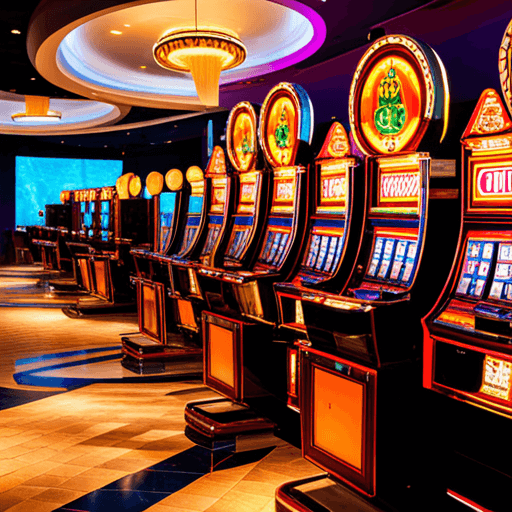
Casino entertainment have long been a engaging form of entertainment, drawing millions of players from varied cultures around the globe. From the glitzy casinos of the Strip to the bustling gambling halls of the Chinese gambling capital, these games serve as a link that unites people across various backgrounds. The allure of luck, strategy, and gambling entices not only those hoping to gamble for profit but also those in search of a shared experience.
The influence of casino games extends significantly past the gaming floor. They often embody the social norms and traditions of the cultures in which they thrive. migliori siti scommesse non AAMS Games such as poker, 21, and roulette have woven themselves into the tapestry of cultural phenomena, influencing everything from films to fashion. As we explore this captivating intersection of luck and life, we can gain insights into how these games shape and are affected by the surrounding world.
Historical Development of Gaming Games
The roots of casino games can be tracked back to ancient cultures, where betting in various forms was widely engaged in. In China, around two thousand three hundred years before Christ, a variant of gambling known as Keno was common, while in historic Rome, soldiers would often wager on the consequences of their games. The concept of using randomness for entertainment and income developed over the ages, leading to the formation of more organized activities. By the end of the Middle Ages, gambling houses initiated to appear in European nations, especially in the Italian peninsula, which introduced early forms of well-liked games still enjoyed today.
As betting gained popularity in European regions, the 17th and 18th centuries saw the rise of gambling establishments as exclusive locations for betting. The initial official gaming venue, the Ridotto, was founded in Venice in 1638, providing games like Baccarat and the game Faro. This period marked a crucial pivoting point, as gaming venues began to draw not just the high society but also the burgeoning middle-tier society. The complexity of activities increased, leading to the development of new rules and versions that enriched the gaming experience.
In the 19th century, the industrial age and changes in societal norms additionally changed the landscape of casino games. The launch of roulette and modern slot machines drew a more diverse audience, and casinos became seen as acceptable entertainment. This time witnessed the international spread of casino activities, as casinos spread from the continent to the Western Hemisphere, culminating in the establishment of the iconic Las Vegas Strip in the 1900s. The progress of gambling activities has progressed into the current era, including new technologies and digital platforms, rendering them accessible to a global market.
### Cultural Importance across Diverse Communities
Gambling games have significant social significance across many societies around the planet. In Las Vegas, the very fabric of the urban landscape is woven around gambling establishments, where playing is not just a hobby but a key aspect of social engagement and social interaction. The dazzling lights and vibrant atmosphere attract countless individuals, showcasing how casino games can shape local economical structures and cultural uniqueness. This environment transforms the notion of recreation into an immersive event that affects fashion, melodies, and even film.
In contrast, some communities treat betting with more caution, viewing it through the lens of ethical beliefs and heritage. A case in point, in many Asian societies, games like Mahjongg and Pai Gow are full of history and carry significant social relevance. These games are often played during meetings and celebrations, fostering community bonds and reinforcing familial ties. The act of participating in these games goes beyond mere amusement, reflecting ethics such as respect for elders and the value of collective enjoyment.
At the same time, in Western countries such as Monte Carlo and Rome, gambling activities serve as symbols of wealth and refinement. The refined atmosphere of these establishments attracts both tourists and native inhabitants, reinforcing a sense of status and exclusivity. The art of poker and the tactical components of games like the game of baccarat are appreciated, molding interpersonal interactions and cultivating an allure that fascinates a varied audience. This emphasizes how casino games can simultaneously mirror and mold societal views towards risk, gain, and social interaction.
Economic Impact and Tourism
Gambling activities play a crucial role in the economic landscape of many regions, particularly those that depend significantly on tourism. The revenue produced from casino operations fuels local financial systems, creating employment opportunities not only within the casinos but also but also in connected industries such as hospitality, dining, and entertainment. This influx of tourists, drawn by the allure of gambling and the overall casino experience, stimulates spending across multiple local enterprises, contributing to the economic health of the area.
The presence of casinos often leads to the development of infrastructure, including lodging, public transit, and leisure amenities. These developments are essential in improving the overall tourist experience, making locations more attractive to tourists. Additionally, many casinos contribute in local communities through support of activities and charitable activities, further embedding themselves into the community structure of the region. Such contribution not only supports economic growth but also cultivates a positive image of the casino industry.
In addition, the worldwide appeal of casino games drives competitive tourism, with locations vying to attract gamblers from around the world. Iconic locations like Las Vegas and Macau have become identifiable with casino culture, drawing millions annually. This advantage encourages creativity and diversification within the gambling sector, influencing trends in leisure and hospitality that resonate beyond their borders. The ripple effects of this visitor influx extend wide, impacting local economies and cultural interactions on a global scale.
